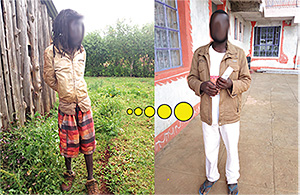
The family of 49-year-old Moses Mwaniki realized that all was not well with him soon after he completed his secondary school education in 1992. While working together with his father mending a broken fence in their term, he suddenly became hostile and violent when he was asked to replace one of the posts. After that, he attempted to commit suicide by drowning himself in a river. This situation left his family at a loss. They could not understand his behaviour as there had been no prior warning. All along he appeared just like any other youth, with a bright future ahead of him.
His Situation continued to deteriorate, and his behaviour became more and more unpredictable. He would walk around the trading centre in his home area, writing incomprehensible messages on walls and other surfaces. The community around him became hostile towards him and always chased him away, fearing that he would destroy their properties.
His family tried to find treatment for him even though it was very challenging to take him to the hospital. Over time, Moses was admitted at Mathari Mental Hospital three times, but each time the improvements were short-lived. The family gave up any hope that Moses would ever recover. He became more aggressive to the point that he attacked his father, causing him to lose two teeth. The family lived in fear and started to suspect that Moses may be abusing hard drugs. This would explain the lack of progress after treatment! This constrained his relationship with his family further and alienated him from any social contact considering that the community was already hostile to him. Moses became suspicious of other people, while those around him avoiding him. He became increasingly isolated and spent much of his time alone - cooking alone, eating alone.
For five years before his contact with St.Martin CSA's Community Programme for Addiction and Mental Health (CPAMH), there were no incidences of violence involving Moses, possibly because he had minimal contact with other people. He was alone in his world. lt was at this point that a volunteer trained by the programme identified Moses as a person who could benefit from the programme's interventions. He approached his parents and in many visits, explained the proposed interventions. The family had lost hope due to the many previous attempts to seek treatment that did not result in sustainable changes. The volunteer was able to convince them not to give up on Moses just yet. Finally, having brought on board his parents, the volunteers organized an assessment which determined that he should be referred to a psychiatrist in Nakuru. He was diagnosed with psychosis, and a treatment plan was drawn up. The volunteer continued to follow up, ensuring that Moses was consistent with his clinic appointments and his medication. With time Moses became more open to his family members, and the volunteer slowly reactivated his social connections. As his situation improved, he accepted to attend the monthly empowerment sessions and support group meetings organized by the project. At these meetings, he started to reestablish contacts with people in the community outside his immediate family. Consequently, he has developed an interest in farming to contribute to his livelihood. The programme supported him to buy seeds and fertilizer which he used to plant maize on half an acre. He intends to expand to one acre in the coming planting season. "I lost my son for more than twenty years, but God has now brought him back to me,'' were the words of Moses' mother when describing the changes that have been witnessed in his life.






